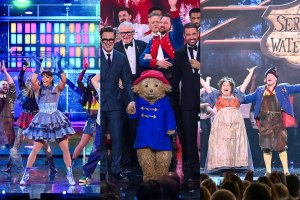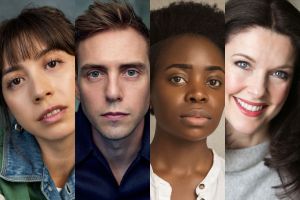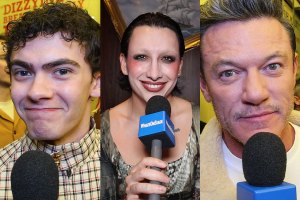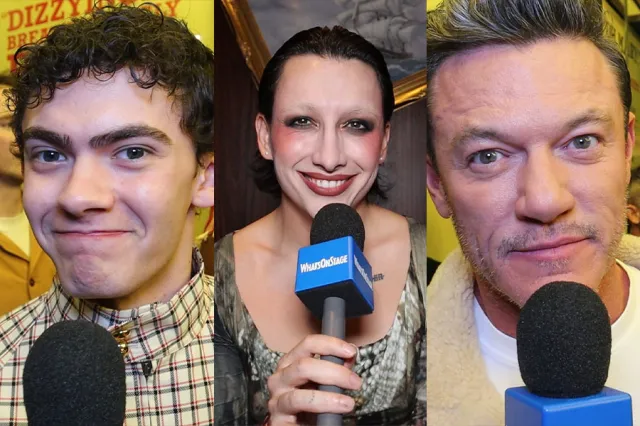20 Questions With…Mary Stuart Masterson
Hollywood’s Mary Stuart Masterson, who this week makes her West End debut opposite Kevin Spacey in National Anthems, reveals how birth was her big break, why the best actors have no ego & why she wants to be part of London’s arts discussion.
It seems that Mary Stuart Masterson was destined to act. Both her parents are film actors, Peter Masterson (The Exorcist) and Carlin Glinn (Three Days of the Condor), as are her siblings, Alexandra and Peter Masterton (II).
Indeed, Mary Stuart Masterson’s first film appearance was alongside her father in the 1975 version of The Stepford Wives at the tender age of nine. She went on to make a name for herself in the 1980s and 1990s in films like Heaven Help Us, Some Kind of Wonderful, Fried Green Tomatoes, At Close Range, Bad Girls, Some Kind of Wonderful, Benny and Joon with Johnny Depp and Bed of Roses with Christian Slater.
Masterton’s forthcoming films include The Sisters, based on the Chekhov stage play Three Sisters, and family affair Intervention, in which she stars alongside her mother and is directed by father.
Masterson’s American theatrical experience includes in Alice in Wonderland (her first professional stage role at the age of 15), Lily Dale, Three Sisters, The Luck Spot, Cat on a Hot Tin Roof. Last year, appeared on Broadway opposite Antonia Banderas in the musical Nine, for which she received Tony, Outer Critics’ Circle and Drama Desk nominations.
Masterson makes her West End debut this week, appearing with Kevin Spacey and Broadway’s Steven Weber in the UK premiere of American playwright Dennis McIntyre’s 1988 three-hander National Anthems at the Old Vic.
Date & place of birth
I was born in Los Angeles, California, on 28 June 1966. My parents were struggling actors who had always lived in New York, but they had a year in LA. We moved back to New York when I was a year and a half, and I was brought up there.
Training
I was working from the time I was in high school, so I would periodically stop and take class, learning about dancing and doing this and that whenever I had the time. But I didn’t go to a conservatory or a full programme. The last time I was in school was about ten years ago, finishing my second year, through an inter-disciplinary programme at Goddard College in Vermont. I’d like to finish sometime, or at least continue – I never feel I’m done with school!
Lives now in…
I split myself between New York and LA – I own real estate in LA, but my home is really New York.
First big break
Getting born! The first film I did was The Stepford Wives with my father. I saw it again recently and was amazed at how uncomfortable I looked – I wasn’t an actress yet, and my hands were tiny little balls of fist! My first big career break was a movie called Heaven Help Us in 1984, because that was a legitimate job. And for me, getting a movie called At Close Range was a really big deal: to get to work with Sean Penn and Christopher Walken and James Foley was a great and inspiring moment in my life. Some Kind of Wonderful was a breakthrough in the public’s mind, and then Immediate Family was a break creatively.
Career highlights to date
When you’re doing something, that’s your highlight! But I feel like I’ve had a chance to learn from everything, good or bad that I’ve done. I think, on a personal level, doing the musical Nine on Broadway was a pretty high moment. To sing in front of people for the first time was also a scary thing to do, but it was really liberating to get past that fear and also to work with that company of actors and with director David Leveaux.
Favourite productions
Nine, definitely. And National Anthems now has been fantastic and tremendous. The esprit de corps and the investigation of a really interesting play has been really fun. I’ve never laughed so hard in rehearsal as I have on this. Benny and Joon was a great experience – again, because of the connections between Johnny Depp, Aidan Quinn and me. We had a special kind of chemistry; I will never forget the days I spent making that movie. When you play a role like that, you realise how fragile one’s sense of self really is, and that any one of us could be any one of us. There but for the grace of God… Fried Green Tomatoes was a great experience. Mary Louise Parker was amazing. I worked on the script with the director for a year before I was even cast. He gave me the book and script and we talked and talked and talked about the character and the writing. Luckily, I got to play the part. Often, you help to develop the role and then they give it to someone else!
Favourite co-stars
Steven Weber and Kevin Spacey, whom I’m working with now. I’ve been so lucky, I’ve worked with so many great actors, even just in the last year. Both of the men who played my husband in Nine on Broadway – Antonio Banderas and John Stamos. I also had an amazing experience doing Cat on a Hot Tin Roof in Washington last year, with Jeremy Davidson who played Brick, and George Grizzard, Dana Ivey and Emily Skinner, who were also in it. And in film, actors like Mary Louise Parker, Johnny Depp, Aidan Quinn and Sean Penn. For my money, the actors I enjoy working with are the ones who are really generous and free. When you get that mutual trust going, it makes it feel like anything’s possible and there’s absolutely no room for any kind of posturing or ego. People can speak their mind and know they’re being listened to. It becomes a utopian experience.
Favourite directors
David Leveaux, because he creates that environment I spoke of, and he has limitless imagination and appreciation for the human experience. David Grindley, who is directing National Anthems, is wonderful. His process is totally inclusive and he’s really respectful of everyone’s input and views, and yet is also very clear about the music of the piece and the overall rhythm of it. I really appreciate the fact that he’s so technically proficient and yet at the same time allows for the back story – the deeper work that needs to go into making something believable. Oftentimes, you get one or the other with a director, but rarely both. On film, I love working with my father. He’s a tremendous director of actors, and there’s such a degree of trust that you can’t even tell you’re working. We recently did an independent movie called Intervention together that’s just being completed, and before that, we did a film called Lily Dale, with a script by the playwright Horton Foote, for Showtime. Francis Ford Coppola, of course, is an absolute genius and innovator, like a conductor of a great orchestra.
Favourite playwrights
Last summer I did Cat on a Hot Tin Roof in Washington DC, and I believe that Tennessee Williams is my favourite playwright. I love poetry and I love drama, and I could read Williams all day long. Of course, I also love Shakespeare, and am fascinated by Strindberg and Ibsen. I would love to give them a try – if anyone has the courage to cast me!
What roles would you most like to play still?
I would love to work on Hedda Gabler some day, and also play Nora in A Doll’s House. More than that, there are some Tennessee Williams plays that no one has really figured out yet. Clothes for a Summer Hotel is one that I’m fascinated with. I don’t know how you solve it, but I would love to work on it. I’d also love to do Sam Shepard’s Fool for Love – not in a big house, but in an intimate way. There are so many plays I’d like to do…
How different is working on stage to working on screen?
Ultimately it’s the same thing. Whether it’s comedy or drama, film or stage or musical theatre, it all comes form the same place, or it should. Technically, I’ve learnt more from doing a long run of a play than I have ever learnt from doing a film – but there’s something about doing a film that is similar to rehearsing a play. The audience gets to witness the actors discovering each moment for themselves on film, whereas the audience in a theatre gets to see a more edited performance, hopefully presented in as real a way as when the actors first discovered it. Although the actor gets to be that editor for the stage, you can’t, of course, always guarantee that the quality of first discovery will appear every night. But what you do get on stage is a more fully committed, finished performance. That’s what’s so great about it. Over hundreds of performances, you get to refine your timing, your voice and so on. Physical stamina to do theatre is important – your ability to breath and be flexible. But when you do a film, you have to work 18 hours a day, so if you’re going to survive, you need stamina for that as well.
What’s the best thing you’ve seen on stage recently?
I saw Stephen Dillane do “The Scottish Play” all by himself in LA. It was such a beautiful piece of acting, and a lesson in ease and specificity. It was a one-hour, 45-minute version without an interval, and he played all the characters as projections of the king’s mind. This summer I also saw Shining City at the Royal Court. Conor McPherson is an amazing playwright, and the most exciting new playwright I’ve seen. It was thrilling to see that, and I hope it gets to New York. I also saw Jumpers on Broadway, and I thought that was extraordinary – Essie Davis and Simon Russell Beale were both great.
What would you advise the government (British or American) to secure the future of theatre?
I don’t know enough about what the government here does, but in America the theatre and arts in general are not viewed the way they should be: as absolutely necessary, integral parts of our culture and humanity. Theatre is so vital and has been so for centuries, but it seems at risk now. So the government should be putting bucketloads of money into it and promoting the arts through education from an early age. The cutbacks on funding are ridiculous. It’s crazy how little is spent on arts programmes, endowments and education. Producers are basically philanthropists now – they rarely break even. Everyone is getting squeezed, and you have to wonder why, when the city of New York will make so much money on tourists coming to see shows on Broadway, why funding can’t be given to subsidise certain plays.
If you could swap places with one person (living or dead) for a day, who would it be?
Can it be two or three? I would like to have been Neil Armstrong – it would have been really cool to be on the moon! And Buster Keaton, just to experience moving in his body for one day. And the dancer Suzanne Farrell, to have danced like her for one day would be awesome!
Favourite holiday destinations
I love Italy – I’ve been about four or five times – and I love Europe. But actually, I need to go somewhere with warm water and sunshine in the next year. I’ve not been on that kind of holiday in five years. I love water of any kind.
Favourite books
I love to read – it’s my favourite thing to do. But there are so many favourite books, I’m afraid I can’t commit to one. I love authors like Salinger, Kundera, Jane Austen and Zola, and the poetry of e.e. cummings.
If you hadn’t become an actor, what would you have done professionally?
A writer – but then I am already doing that, too. I’ve written several screenplays and pilots, and we’re hopefully shooting a film I wrote this fall. But you never know if things are going to happen or not. I’m also working on some fiction and poetry.
Why did you want to accept your part in National Anthems?
Doing this play now feels perfectly timed. It takes place in America in 1988 in yuppie Detroit, and deals with the clash between materialistic values that are supplanting traditional American values of service and community. I think there couldn’t be a better time to look at that. It was probably before its time when it was first written. I play Leslie Reed, who is married to Steven Weber’s character Arthur Reed. We’ve just moved into a fancy house that we can barely afford and are trying to keep appearances up. She’s trying to be the perfect hostess and get everything right, but ultimately she has put the things she cares about on hold. Somewhere in all of that, their relationship has become less than it was when they met – it got buried underneath all their stuff.
Why did you want to come to London to do this play?
I came here in the summer for a week, and I love it here. It’s a great, great city and it feels like it’s a great moment for a great city. It’s so vibrant. And it’s a place that seems willing to discuss things honestly. It’s also a great place to do theatre. People seem to genuinely appreciate and love the theatre here, so I want to be part of that discussion.
What’s your favourite line from National Anthems?
There are many great lines, but I’m afraid to say one of my own, in case that ends up making me feel self-conscious about it!
What’s the funniest/most notable thing that’s happened in rehearsals of National Anthems?
There have been lots of times when we’ve each done something completely within character, but the other will start laughing and not be able to stop, and then all three of us will not be able to stop, for minutes at a time! It has happened so many times. I think we’re laughing at the potential for each of us to be these people – and it’s not a comfortable thought!
What are your plans for the future?
I hope to be shooting a film that I’ve written, and I am cautiously optimistic that it’s going to happen. Another film that I did this summer, The Sisters, is premiering at Tribeca Film Festival in New York in April. I want to do more theatre and continue with my writing. I have also written a play that I want to work on with some actors and workshop, and try to fix it! I like where my life is right now!
– Mary Stuart Masterson was speaking to Mark Shenton
National Anthems opens at the West End’s Old Vic on 8 February (previews 1 February) and continues until 23 April 2005.












